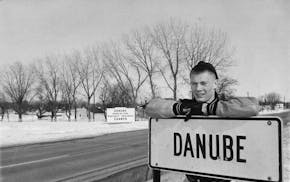As planning for the Cedar Avenue transitway rolls through the final stages, a couple of the barriers to completing the design are just that: noise barriers and access barriers.
Dakota County Board members want fewer of the former, despite urging from the federal government, and more of the latter, despite objections from local businesses.
Final decisions on the noise walls and the access points need to be reached soon because improvements on the 16-mile corridor are on a tight schedule, driven in part by the deadlines that come with 14 different funding sources.
The Apple Valley and Cedar Grove transit stations are already under construction, as is a park-and-ride in Lakeville. Commuter express buses will start running this fall and full-fledged bus rapid transit -- a station-to-station service that operates like light rail but features a bus in a dedicated shoulder lane instead of a train on a track -- is planned for 2012.
Work on utility improvements is scheduled for next summer, with other related road construction kicking off in September 2010.
But design, which dictates the necessary property acquisition, comes first.
"There are some things that need to be cleared up," said Commissioner Paul Krause, chairman of the physical development committee, after the board heard a staff presentation on the noise walls and a debated business driveway that will be closed.
The noise walls are a newer hurdle, something that the county and the city of Apple Valley had already chosen not to pursue, for cost reasons in one location and for aesthetic reasons in others.
But the Federal Highway Administration, which holds the purse strings on $22 million for the Cedar corridor, asked for more resident input at two locations in Apple Valley.
Residents of four properties along Cedar north of 160th Street said they would like a noise wall, as do residents of six properties along Cedar south of 153rd Street. Because those voices constitute a majority of reachable residents in the immediate area, the federal agency says noise walls should go in.
That option wasn't popular with commissioners, or the Apple Valley city administrator, who attended the meeting to note that the City Council had passed a resolution saying it did not want any noise walls.
Commissioner Tom Egan, citing the millions of dollars in federal funding that hang in the balance, said "I think we have to weigh this very carefully."
The access barriers were a more familiar issue. The county has been working for almost three years on a plan to close some driveways and limit turning at some intersections, but business owners at the meeting were still unhappy.
Brothers Mark and Joe Stranik, who own the Midas shop on Cedar near 155th Street, said it will hurt business if they lose their driveway on the thoroughfare. They have already lost parking spaces to station construction.
"It's kind of a big whack to take," Joe Stranik said.
Commissioner Will Branning said he wanted to see the county work with Stranick to see if the driveway could remain open.
But county transportation manager Mark Krebsbach said it's critical that the driveway be closed because it poses a safety problem, as it would cause drivers to merge into the bus lane, just as buses are pulling up to the Apple Valley transit station, to make the turn.
"Our Number 1 priority on Cedar Avenue is safe, efficient movement of people," he said.
Krebsbach also noted that the Midas shop and adjacent strip mall have two other access points, on Whitney Drive and 155th Street. Drivers would only have to go about 600 feet farther to make the turn at a stoplight, he said.
Katie Humphrey • 952-882-9056

Minnesota music legend Spider John Koerner dies at 85

Reusse: What a life it was for Bob Bruggers

Minnesota Legislature races toward deadline with bonding, rideshare bills in question

Dispute over Ramadan hours leaves owner of Turkish cafe facing drop in business


